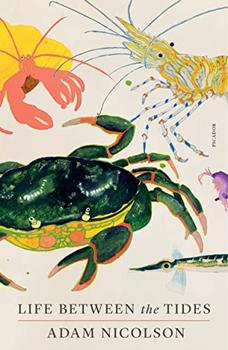Summary | Excerpt | Reviews | Beyond the Book | Readalikes | Genres & Themes | Author Bio

I realised soon enough that I loved that stillness and that a rock pool would have it. I searched the bay but could not find one: only beaches and a wide rim of ragged stone in which there are no true hollows to hold the water. Then, I thought, perhaps I could create something like a stillness-cupping pool, a parenthesis cut out of the world of flux, an extension in time of what in the open sea is only a moment of calm. A pool, or even two or three: to make them at the beginning quite naked, exactly as the words say – a rock pool, a dish of rock on the shoreline, as if it were part of the earth before life had come to clothe it. And then, slowly, to allow the sea to bring life to that dish, to make it a living thing. It would be gardening the sea, providing not flower beds but life beds.
The foreshore in this bay is 'Presumed Crown Land'. Long debate filled much of the nineteenth and twentieth centuries over the ownership of 'that part of the land which is neither always wet, nor always dry due to the ebb and flow of the incoming and outgoing tide'. About half of the foreshore in Scotland was claimed by the neighbouring landowners, largely on the basis that their tenants, when gathering seaweed for fertiliser or to burn for its chemical residues, had paid the landowners rent for it. Scandalously, if rent was paid, ownership was implied. The relatively small amount of weed collected here meant that no rent was ever paid and so this bay went unclaimed. As Crown property, it is now administered by the Crown Estate Commissioners for Scotland.
Statutory public rights on the shore are thought to include (even if they are not yet enshrined in Scottish law):
swimming, sunbathing, playing games, going for a walk, having picnics, lighting fires and cooking food, gathering shellfish (except mussels and oysters, to which the Crown retains the rights), fishing (except salmon, ditto) and shooting wildfowl (as long as they are over the foreshore when shot), embarking, disembarking, loading and unloading a boat, drying nets, gathering bait and making sandcastles.
I wasn't sure if my pools would come under the heading of 'making sandcastles' and so I applied to the Crown Estate Scotland for permission. They paused to think but in the end, for a small fee, and with the agreement of Marine Scotland, the government's sea agency, I was allowed to make some pools on the edge of the bay at Rubha an t-Sasunnaich. A little woundingly, when I eventually sent some photographs of the work I had done, Tony Bennett, the Crown Estate Marine Officer for Argyll, said, 'I see no issue with them as they do not appear to be any different to anything built by local children during the holidays.' All the same, the pools at Rubha an t-Sasunnaich are now marked on the general asset map of the Crown Estate Scotland website, with the CES reference number AR1-34-2.
He was right though. Making the pools, even if they each took days of work, was partly a way of playing with nature; partly to make good a lack, to create a still-stand of my own, a small piece of a sea world by which I and Sarah and the children could wait and watch; and partly so that I could learn what this nature was. The pools would be discreet. I would be careful to keep them almost hidden, or at least scarcely noticeable. By definition, they would be invisible under the sea for much of the time. They would be an invitation to life, an act, as I learned to call it, of bio-receptivity, even bio-reciprocity, an enrichment of the habitat, not a subtraction from it.
The shore, as Seamus Heaney once wrote, is where 'things overflow the brim of the usual', and that brim is at the heart of this book. It is an Old English word that has slowly migrated shorewards. Far back in its Germanic roots, the brim meant the turbulence of a breaking sea, a place where the world roars, and beyond that in the sea-less steppes of the Proto-Indo-Europeans in Central Asia, to brim was to hum like a bee, to make the noise of life. For the Anglo-Saxons it became the surf at the sea margin. From there it moved on again to be the lip or edge of anything, but one in which an overflow was always possible. A brim for us now is an edge at which the limit is gently but slowly reached, a place for the overtopping of a tide or flood, where, as Emily Dickinson once dreamed, our 'Shoes / Would overflow with Pearl'.
Excerpted from Life Between the Tides by Adam Nicolson. Published by Farrar, Straus and Giroux. Copyright © 2021 by Adam Nicolson. All rights reserved.




Dictators ride to and fro on tigers from which they dare not dismount. And the tigers are getting hungry.
Click Here to find out who said this, as well as discovering other famous literary quotes!
Your guide toexceptional books
BookBrowse seeks out and recommends the best in contemporary fiction and nonfiction—books that not only engage and entertain but also deepen our understanding of ourselves and the world around us.